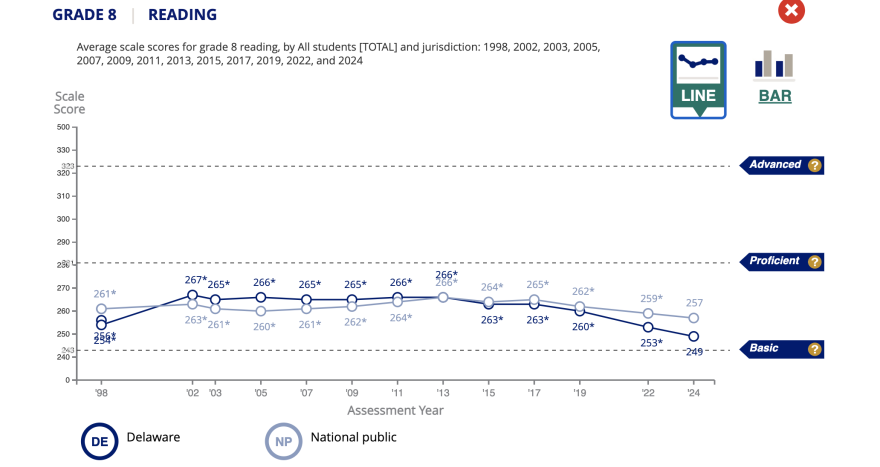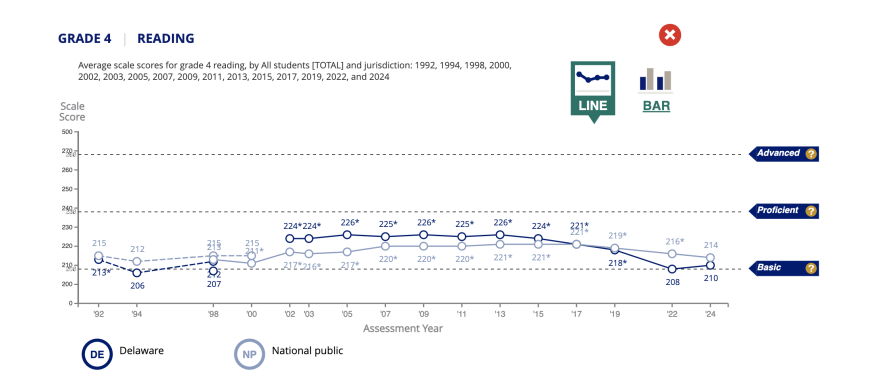Gov. Matt Meyer and Delaware's new Secretary of Education Cindy Marten declare a literacy emergency following the release of eighth grader’s average reading score, which falls 8 points below the national average and marks the lowest score in 27 years.


The 2024 Nation's Report Card reveals Delaware fourth graders saw small gains in math and reading compared to 2022, but scores still remain lower than 31 and 30 other states and jurisdictions respectively.
Delaware only ranks higher than Alaska and New Mexico in fourth grade reading proficiency.


Marten was recently sworn in as the First State's new leader of the Department of Education, coming from Washington D.C. where she served as the U.S. Deputy Secretary of Education under President Joe Biden's administration.
She has over 36 years of experience as an educator, spending just under two decades in the classroom and then working her way up from vice principal to principal and ultimately superintendent of the San Diego Unified School District in California.
Marten says although the First State is headed in the wrong direction in terms of proficiency rates, she is ready for the challenge of bringing the National Assessment of Educational Progress (NAEP) numbers up and improving quality of eduction as a whole.
“It takes money, it takes investment and it takes sustained effort, and that's really how you turn it around because this noticeable decline in NAEP scores in Delaware, when we're looking at the literacy rates— I mean it's like a historic low, below the national averages, and so it's time to turn that around.”
Marten herself is a literary expert, holding a reading specialist certificate out of California and serving as a reading coach and a reading specialist in her first 17 years of teaching.
She is also the author of Word Crafting: Teaching Spelling, Grades K-6, which addresses how, when and why spelling should be taught while situating spelling within the contexts of real writing and the individual learner's needs.
While working as a reading specialist, she said her goal was to intentionally work herself out of the job, providing tools and tactics for teachers so they could become their own reading specialists in the classroom.
"The teachers should be their own reading specialist in the classroom. And if you don't know how to teach a student in your classroom in front of you how to read, and you have to send them out for them to learn to read, then you're not equipped with what you need to teach every student that you have. And so if I can teach teachers through a support and coaching model, then they're going to learn what they need. That's an ongoing investment in them," Marten explained.
She is particularly enthused about Delaware’s recent $3 million commitment to employing 20 early literacy coaches across the state.
She says this was a strategy implemented before her time as superintendent of the San Diego Unified School District, and she replicated a similar approach with student centered coaching cycles.
“When we're making that kind of investment, I already know the investment works. I've already seen it work. I already know how to design a program that will deliver results. Now it's the details that will matter," she said.
Marten plans to employ a variety of additional tactics, including investing in teacher professional growth, creating accountability systems to track student progress, and most notably, developing an equitable funding formula for the state.
Marten spearheaded implementing California's Local Control Funding Formula (LCFF) in 2013 within the San Diego Unified School District, which replaced an inequitable funding model that was in place for 40 years prior.
"When California went to this equitable funding formula, the large urban districts arguably benefited with more funding. And the reason why is every district got a base grant, and then they got a supplemental grant based on individual student needs, whether it was low income, African American students, Hispanic students, English learners," she explained. "Students from different subgroups that we invested in — we invested with systemic supports for them —and we beat the odds. The odds were, if your demography does determine your destiny — which I don't think it does — but the odds were that they they would have still been performing low. It worked. And so I have significant experience in implementing that."
Marten will be attending the next full meeting of the Public Education Funding Commission on Feb. 10, which has been reviewing Delaware's current funding formula and plans to release its first set of recommendations by October.



